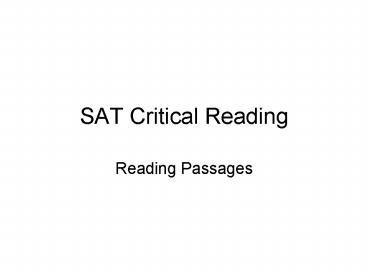SAT Critical Reading PowerPoint PPT Presentation
1 / 13
Title: SAT Critical Reading
1
SAT Critical Reading
- Reading Passages
2
3 Types of Reading Passage Questions
- Long reading passage
- Short reading passage (2 or 3 paragraphs)
- Paired reading passages (2 short or long
passages, usually presenting different views on
the same topic) - Passages can be nonfiction or fiction
- Each passage has an "introductory" sentence above
it that explains the context of the piece. Don't
skip over thisit can be very helpful! - Questions are NEVER based on outside knowledge
you are supposed to answer the questions only
from what is given in the passages
3
Time
- Generally, you should spend about a minute for
each question in a passage. So if a short passage
has 4 questions, you shouldn't spend more than 4
minutes on the whole thing - If a long passage has 7 questions, you should
expect to spend about 8 or 9 minutes to get
through with it
4
About Passages
- Unlike the other parts of the test, Reading
Passages are NOT arranged in order of difficulty
like the rest of the SAT. - Instead, they are arranged by the order they are
answered in the passage.
5
Don't Jump From Passage to Passage
- A section will contain several passages. Don't
read one, decide you don't like it, read another,
and another, etc. If you do this, you will spend
too much time reading and not enough time
actually answering the questions
6
General Tip for All Question Types
- Whenever you are reading for the first time, it
might be a good idea to quickly summarize each
paragraph for yourself and maybe make a very
brief note - Then, when you are at a question that has you
look back to a particular section of the passage,
eliminate any answers that don't fit in with your
summary
7
Approaches to Short and Long Reading Passages
- Skim through the entire passage (read quickly,
underlining the main points and getting the big
picture) before going to the questions - Read the first few paragraphs, answer the first
few questions (skipping "big picture" questions
until the end), and continue jumping back and
forth - If the passage is very long or on a topic you
don't understand at all, read through the
questions first and find the "words in context"
type questions and other questions that don't
require you to understand the entire passage
8
Approaches to Paired Reading Passages
- Read one passage first, then answer all the
questions dealing only with that passage - Answer the questions comparing the two passages
when you get all the other questions finished
9
Topic and Main Idea
- topic what is the passage about?
- main idea the central idea in the passage, which
can be - an answer to a question in a analysis
- a thesis statement in an argument
- a conflict that the character deals with or
overcomes in a narrative - Answer main idea or summary questions last.
Eliminate answers that are either too broad, too
general, or too narrow. Also eliminate answers
that are either not supported or contradict what
is said in the passage - secondary idea the main idea of an individual
paragraph of the passage, as opposed to the whole
thing. They give you the lines to look at for
these type of questions, read the line above and
below it, summarize, then look at the answer
choices after you've made your own summary first
10
true but wrong
- Occasionally, answer choices will be both true
and wrong. That is, they may be statements that
are true, but they are not the best answer to
whatever the question is. - In "vocabulary in context" type questions, a word
may have several definitions, and more than one
of them might appear as answer choices. You are
trying to pick the one that best fits the word as
it is used in the passage, so be careful not just
to pick the one you know matches the word.
11
"According to the passage"
- If a question says "according to the author" or
"according to the passage," you must answer the
question based on what the author has stated,
even if you disagree with what the author has
said. - These questions are testing your ability to
understand what a writer has written and what
they mean. It is not meant to test what you
already know or believe. - The correct answer to these type of questions
will be explicitly backed up by a statement in
the passage. If you have time, try to find it.
12
Implies, Infers, and Suggests
- If the question says "The author implies" or "It
can be inferred" or "The author suggests" or
anything like this, the answer will not be
explicitly stated in the article. - Again, be careful to answer based on what the
passage says, and not based on your prior
knowledge or beliefs. - Try to find one or two places in the article
where that help suggest the answer you choose
13
Recognizing Rhetorical Devices
- In fiction passages, you might have to identify
and understand the use of various rhetorical
devices - parallelism (multiple sentences have the same
structure) - hyperbole (exaggeration)
- repetition
- imagery
- figurative language
- rhetorical questions
- idioms (sayings that dont make sense if you look
at the words individually, or that are unique to
a region, dialect, or situationIll follow
suit, The government keeps tabs on us.) - irony (difference between what might be expected
and what actually occurs)

